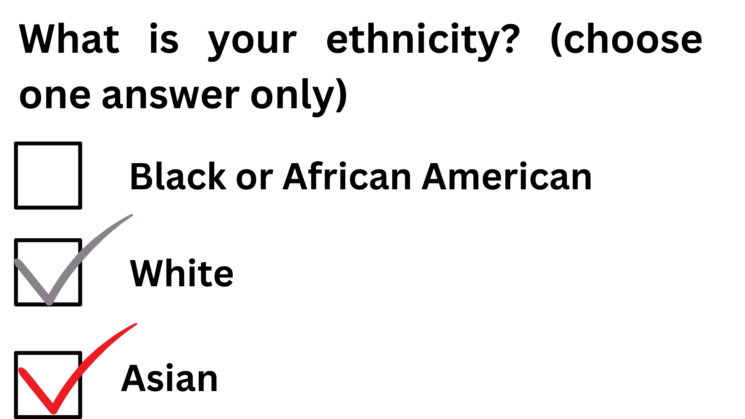
By Arielle Nguyen
Oli London. An English man who dreamed of looking like his idol, Park Jimin, a member of the South Korean boy band BTS. An English man… who underwent 32 surgeries to look like Jimin, identifying as transracial in 2021. Although he has since removed his surgeries, the act of changing your race has become more publicized.
Transracialism, also known as “race change to another” (RCTA) and “ethnicity change to another” (ECTA) respectively, is when a person identifies as a different race than their biological one. Although many Internet personalities have denounced “transracialism” since London, it has become widely popular — and somewhat accepted — on the video app TikTok and the messaging app Discord.
On both platforms, communities of people identifying by RCTA emerged, whether it be videos giving tutorials on changing your hair color using “subliminals” (videos of subliminal messages that are meant to tap into your subconscious awareness) or messaging servers for people with similar interests.
Subliminals aren’t very harmful. There are quiet affirmations that flood the audio, though it’s not loud enough for the conscious mind to hear. Many people typically use them as a form of prayer and hope. For example, if you had an exam in a few days that’s worth a rather big chunk of your grade, maybe you’d resort to these manifestations to cope. YouTubers provide subliminal videos to help with studying, as in to “manifest” a good grade. However, there are subliminal messages with goals that align with RCTA. Promising to fetishize cultures isn’t moral. Various YouTube videos popped up, offering videos with rather obscure goals: monolids, aegyo-sals or glass skin, you name it. All of these features are apparent within Asian races and are typically only found in these races. The fact that changing your race is so “accessible” is disgusting.
Often, you would only focus on things that appeal to you, especially when it comes to people. It’s difficult to notice the “red flags” after you’ve convinced yourself that this person could be a friend. Similarly, people who support RCTA usually only pursue the appearance of their desired race without understanding the struggles and experiences that their race endures. Pursuing only the better things can easily corrupt into fetishization as well.
The fetishization of cultures isn’t a new phenomenon, but it’s easy for someone to display stereotypes as their ideal preference. When you only glorify the stereotypes of a certain culture, you are appropriating it.
Cultural appropriation and appreciation are often mixed, but they’re two distinct ideas. Appropriation is about demeaning a culture whereas appreciation is about honoring a culture. For example, cultural appropriation can be seen when non-Native Americans wear Native American clothing or headdresses, or non-Asian people dress up to appear Asian.
People who identify themselves as the stereotypical perspective of a race will only do more harm to said race. Cultural appropriation doesn’t need to be influenced by transracialism; social media often inspires people to contribute to feel trendy. Appropriation and fetishization aren’t cute or trendy. It’s disrespectful to minority races.
However, transracialism may feel like an escape, an outlet for people to feel themselves. It can give you that quick burst of confidence when you feel most beautiful or most “trendy.” Most often, people RCTA to Asian races including South Korean due to the popular music genre, Korean Pop, or KPOP. Perhaps they feel more themselves when listening to music created by someone of a different background or race, or they feel a strong connection to the singer/band.
RCTA can stem from an obsession with a celebrity of a desired race, similar to London’s motives. He has since publicly apologized to Jimin along with any member of the Asian community for his actions.
“It was wrong of me to try to emulate Jimin in such an obsessive way,” London said in a now private YouTube video. “I realize now that it wasn’t the right thing to do … I never meant to cause any offense with my actions and I am sorry if anyone misinterpreted or misunderstood my strong love for Korea and Korean culture.”
The individual may feel like they could be noticed if they put in all this effort to be seen. It’s comforting to feel like the singer could be singing about you, but they’re not. They don’t even know you. It’s better just to be a fan.
It’s also better to not be transracial. Although exploring different personas can be entertaining, you still demean minority races. There’s no excuse for cultural appropriation. Appreciating cultures and other races is vital to communities, and if you want to show support for it, research the culture and appreciate it.
And don’t invest in transracialism.
Works Cited:
https://www.distractify.com/p/rcta-meaning-tiktok
https://www.nbcnews.com/news/asian-america/race-change-to-another-trend-online-rcna93759
https://www.nbcnews.com/news/us-news/oli-london-apologizes-surgeries-appear-bts-star-jimin-rcna45677
https://www.edi.nih.gov/blog/communities/appropriation-and-appreciation-whats-difference





